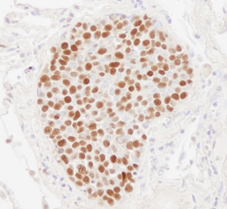The quantification of cell proliferation is one essential prerequisite for the research of biomaterial cytocompatibility in vitro. Several methods have been developed for the quantification of cell proliferation and among all of these methods, immunoassay is a rapid, reliable method to assess cell proliferation.
It is well known that proliferating cells will express some specific proteins that are absent from non-proliferating cells. We can take advantage of this characteristic of proliferating cells to quantify cell proliferation. The specific primary antibodies can be used to identify and combine the antigens that are specific expressed in the process of cell proliferation. These antigens are typically expressed in the perinuclear and nuclear interior regions and can be regarded as excellent cellular markers for cell proliferation. Since these antigens are expressed across all cell cycle phase except G0, they are used to distinguish proliferating cells and non-proliferating cells. There are several kinds of proliferation proteins specifically expressed in proliferating cells including PCNA, Ki67 and MCM-2. Ki67 is a typical and widely used proliferation maker and is routinely used to diagnose and prognose cancer. The utilization of Ki67 as a proliferation marker is a well-established and highly-cited method to investigate cell proliferation and it is applied in both the basic and clinical areas. PCNA is another common marker and can be used to assess cell proliferation. Multiple studies have shown that PCNA is not as sensitive and specific as Ki67 when assessing cell proliferation in tumors. MCM-2 is another typical proliferation marker that is growing in prominence. MCM-2 is also used as a prognostic marker in certain cancers and has been paid much attention in the research of cell proliferation. All the three proliferation proteins can be detected by the immunoassay and specific antibodies can specifically recognize them. Cell proliferation can be evaluated by the determination of viable cells expressed these proliferation proteins.
 Figure 1. The experimental result of Immunoassay for cell proliferation
Figure 1. The experimental result of Immunoassay for cell proliferation
Because of the accuracy and the reliability, the quantification of cell proliferation by immunoassay has many distinct advantages and it is widely used in clinical diagnostic and basic research areas. The high resolution data obtained in this assay makes it possible to get a better understanding of cell proliferation.

Online Inquiry